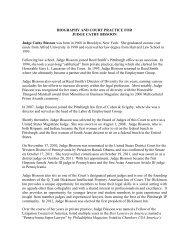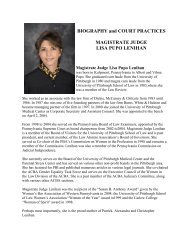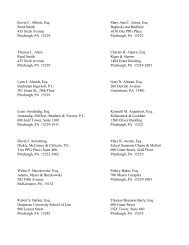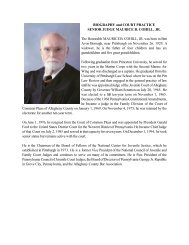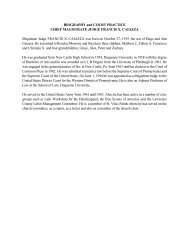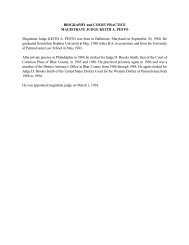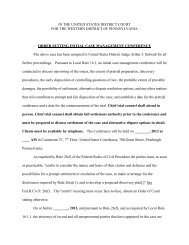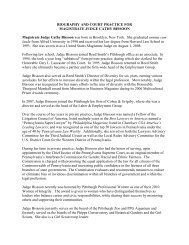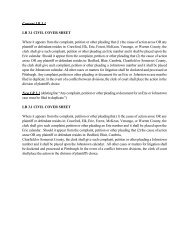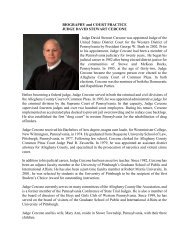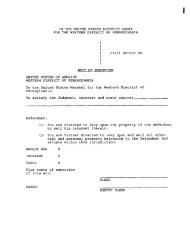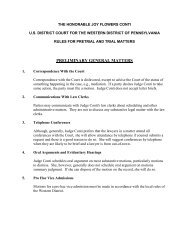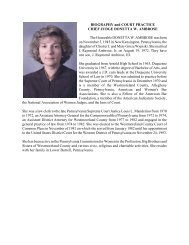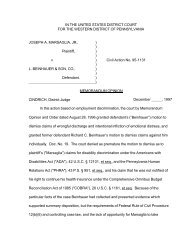Magistrate Judge Susan Paradise Baxter - Western District of ...
Magistrate Judge Susan Paradise Baxter - Western District of ...
Magistrate Judge Susan Paradise Baxter - Western District of ...
- No tags were found...
Create successful ePaper yourself
Turn your PDF publications into a flip-book with our unique Google optimized e-Paper software.
BIOGRAPHY and COURT PRACTICEMAGISTRATE JUDGE SUSAN PARADISEBAXTER<strong>Magistrate</strong> <strong>Judge</strong> SUSAN PARADISE BAXTER was born inLatrobe, Pennsylvania on September 20, 1956. She receivedher Bachelor <strong>of</strong> Science degree from The Pennsylvania StateUniversity in 1978, her Master <strong>of</strong> Education Degree fromTemple University in 1980, and her Juris Doctor Degree fromTemple University School <strong>of</strong> Law in 1983. She taught music in the Wallingford-Swarthmore School <strong>District</strong>for four years prior to receiving her law degree. She began the practice <strong>of</strong> law in Washington, D.C., at thefirm <strong>of</strong> Cole, Raywid and Braverman, now Davis Wright Tremaine LLP, where she was made a partnerin 1989. Her practice consisted <strong>of</strong> commercial litigation, antitrust litigation and contracts. After returningto Pennsylvania in 1992, she served as the Court Solicitor for the Erie County Court <strong>of</strong> Common Pleas.She took the oath <strong>of</strong> the <strong>of</strong>fice <strong>of</strong> United States <strong>Magistrate</strong> <strong>Judge</strong> on January 20, 1995. She becamethe Chief <strong>Magistrate</strong> <strong>Judge</strong> in June <strong>of</strong> 2005.In 1996, she was elected the Director-At-Large <strong>of</strong> the Federal <strong>Magistrate</strong> <strong>Judge</strong>s Association. As amember <strong>of</strong> the executive board, she regularly attended the Advisory Committee meetings in Washington,D.C., <strong>of</strong> the Administrative Office <strong>of</strong> the Courts pertaining to magistrate judges. She served in this capacityfor five years. She has also addressed her colleagues at educational seminars around the country. In 1998,then-Governor Ridge appointed her to the new Pennsylvania Commission for Women, where she servedfor three years. She serves as a member <strong>of</strong> the Erie County Bar Association's Board <strong>of</strong> Directors, and asa Master in the Northwest Pennsylvania Chapter <strong>of</strong> the American Inns <strong>of</strong> Court.She is married to Donald L. <strong>Baxter</strong>, Jr., M.D., and has two children. She is a member <strong>of</strong> the Erie CountyBar Association.
PRACTICES AND PROCEDURES OFCHIEF MAGISTRATE JUDGESUSAN PARADISE BAXTERI. GENERAL MATTERS 1A. Communications with the Court<strong>Magistrate</strong> <strong>Judge</strong> <strong>Baxter</strong> generally does not accept letters or faxes. Allcommunications should be made by way <strong>of</strong> motion, unless otherwise specificallyrequested by the Court.B. Communications with ChambersCounsel may inquire as to the status <strong>of</strong> pending motions or the judge’s docketthrough her courtroom deputy or her law clerks.C. Telephone Conferences<strong>Magistrate</strong> <strong>Judge</strong> <strong>Baxter</strong> will handle some matters by telephone, depending on thecircumstances, in an attempt to serve the convenience <strong>of</strong> counsel and keep thecase moving. It is acceptable to her if one person is present by telephone andanother in person, if a reasonable objection to this division is made however, shewill have all counsel participate via telephone.<strong>Magistrate</strong> <strong>Judge</strong> <strong>Baxter</strong> routinely handles motions for injunctive relief inprisoner cases by a telephonic hearing.D. Pro Hac Admissions<strong>Magistrate</strong> <strong>Judge</strong> <strong>Baxter</strong> follows the Local Rule on admissions pro hac vice.Generally, the district judge handles such admissions.E. Comment to the Media<strong>Magistrate</strong> <strong>Judge</strong> <strong>Baxter</strong> does not approve <strong>of</strong> counsel’s commenting to the mediain pending cases, but she will not place any restrictions on counsel unless suchcomments become disruptive to the proceedings.II.MOTIONS PRACTICEA. Oral Argument<strong>Magistrate</strong> <strong>Judge</strong> <strong>Baxter</strong> typically does not conduct oral argument on pretrialmotions because she does not find it useful. She will hold argument, if requested,if she believes it will be helpful to the court, i.e., on some dispositive motions or1 <strong>Magistrate</strong> <strong>Judge</strong>s’ duties in the <strong>Western</strong> <strong>District</strong> are governed by Local Rule 72.1.
in complex cases. If she deems oral argument to be appropriate, an order willissue. She has no specific days or times set aside for argument.B. Briefs<strong>Magistrate</strong> <strong>Judge</strong> <strong>Baxter</strong> requires legal briefs in support <strong>of</strong> all motions except fordiscovery motions. The supporting brief must be filed contemporaneously withthe motion. Reply briefs are generally permitted.Discovery motions should be brief and must be accompanied by a telephone callto chambers where a conference to resolve the motion will be scheduled by thecourtroom deputy so that the case does not become stalled. The motion shoulddetail the discovery dispute and need not cite case law.C. Chambers Copies <strong>of</strong> Motion PapersIn light <strong>of</strong> the establishment <strong>of</strong> CM-ECF, no paper courtesy copies should be sentto chambers.D. Scheduling<strong>Magistrate</strong> <strong>Judge</strong> <strong>Baxter</strong>’s general practice is to require responsive briefs to befiled within 10-14 days <strong>of</strong> the day a motion is filed and served. Her standard casemanagement order sets out her standard schedule. If a motion is not covered bythe case management order, the judge will issue a separate scheduling order. Shewill grant extensions <strong>of</strong> time to respond when necessary.E. Evidentiary HearingsAt the request <strong>of</strong> the trial judge, <strong>Magistrate</strong> <strong>Judge</strong> <strong>Baxter</strong> holds evidentiaryhearings on pretrial motions on a date separate from, and prior to trial.<strong>Magistrate</strong> <strong>Judge</strong> <strong>Baxter</strong> will hold evidentiary hearings on habeas corpus petitionswhen she deems it necessary.F. In Limine MotionsIf requested by the trial judge, in limine motions will be entertained prior to trial.<strong>Magistrate</strong> <strong>Judge</strong> <strong>Baxter</strong> will also rule on such motions at that time.G. Proposed OrdersIn accordance with the Local Rules, each and every motion shall be accompaniedby a proposed order <strong>of</strong> court. The order <strong>of</strong> court must include language detailingthe specific relief sought, and not simply that the motion “is granted.”III.CIVIL CASES
A. Pretrial Procedures1. Local Rule 16.1<strong>Magistrate</strong> <strong>Judge</strong> <strong>Baxter</strong>’s pretrial statement requirements are set out inher standard case management order. She requires the items set out in theLocal Rules form.After the filing <strong>of</strong> an answer by defendants (or after the resolution <strong>of</strong> atimely 12(b) motion), <strong>Magistrate</strong> <strong>Judge</strong> <strong>Baxter</strong> will conduct the initialscheduling conference. Prior to the conference, the parties shall meet andconfer and file a report pursuant to Fed.R.Civ.P. 26(f).<strong>Magistrate</strong> <strong>Judge</strong> <strong>Baxter</strong> will permit out <strong>of</strong> town counsel to participate inthe first case management conference by telephone with the prior expresspermission <strong>of</strong> the Court.2. Pretrial ConferencesThe trial judge assigned to the case usually conducts the final pretrialconference, except in cases where the parties have consented to thejurisdiction <strong>of</strong> the <strong>Magistrate</strong> <strong>Judge</strong>. In consent cases, an order will beissued to the parties for the requirements <strong>of</strong> the pretrial conference.3. Settlement<strong>Magistrate</strong> <strong>Judge</strong> <strong>Baxter</strong> is willing to participate in settlement conferencesat the request <strong>of</strong> the parties. <strong>Magistrate</strong> <strong>Judge</strong> <strong>Baxter</strong> requires thatsettlement conferences be held in Erie and parties and attorneys must bepresent at the conference. Persons with authority to settle must attend thesettlement conference with the attorneys. In limited circumstances,<strong>Magistrate</strong> <strong>Judge</strong> <strong>Baxter</strong> will allow a party to be available by phone butonly with the express permission <strong>of</strong> the Court and the opposing party.<strong>Magistrate</strong> <strong>Judge</strong> <strong>Baxter</strong> does not require written summaries inpreparation for a settlement conference.4. Extensions and Continuances<strong>Magistrate</strong> <strong>Judge</strong> <strong>Baxter</strong> considers motions for extensions <strong>of</strong> time andcontinuances on a case-by-case circumstance-specific basis. Suchrequests are usually granted so long as they are reasonable in length, notfrivolous, and not repetitive. With regard to scheduled conferences orhearings, <strong>Magistrate</strong> <strong>Judge</strong> <strong>Baxter</strong> is reluctant to reschedule these matterswithout good cause.B. Discovery Matters1. Length <strong>of</strong> Discovery Period and Extensions
<strong>Magistrate</strong> <strong>Judge</strong> <strong>Baxter</strong> generally allows 120 days for the completion <strong>of</strong>discovery – unless it is a simple case needing less time. She will grantrequests for extensions if they are reasonable.2. Expert Witnesses<strong>Magistrate</strong> <strong>Judge</strong> <strong>Baxter</strong> follows Fed. R. Civ. P. 26(b)(4) as to depositions<strong>of</strong> expert witnesses.3. Discovery/Deposition Disputes<strong>Magistrate</strong> <strong>Judge</strong> <strong>Baxter</strong> will entertain telephone calls from attorneys at adeposition to resolve a discovery dispute. She will take or return calls asshe is available.4. Stay <strong>of</strong> Discovery<strong>Magistrate</strong> <strong>Judge</strong> <strong>Baxter</strong>’s general practice is not to stay discovery duringthe pendency <strong>of</strong> a dispositive motion. A stay may be sought by motionbut will be granted only if the right to relief is clear or some othercompelling reason exists. Absent a motion to stay, the parties shouldassume that discovery is appropriate.5. Limitations on DiscoveryAs a general matter, <strong>Magistrate</strong> <strong>Judge</strong> <strong>Baxter</strong> does not impose anylimitations on the use <strong>of</strong> particular discovery procedures outside <strong>of</strong> theFederal Rules <strong>of</strong> Civil Procedure or the Local Rules <strong>of</strong> this Court.6. Rule 11 Motions – Rule 37 Sanctions<strong>Magistrate</strong> <strong>Judge</strong> <strong>Baxter</strong>’s practice is to rule as soon as possible on Rule11 or Rule 37 motions. In lieu <strong>of</strong> a supporting brief, she would prefer toreceive a telephone call to chambers noting the filing <strong>of</strong> a Rule 11 or Rule37 motion, so that an argument can be scheduled on the motion quickly.C. Injunctions and TROs<strong>Magistrate</strong> <strong>Judge</strong> <strong>Baxter</strong> generally holds argument on all motions for preliminaryinjunction and temporary restraining order, including prisoner motions. They aretypically held telephonically in prisoner cases, and in the courtroom in nonprisoner matters. <strong>Magistrate</strong> <strong>Judge</strong> <strong>Baxter</strong> issues a Report and Recommendationon all such motions.D. Trial Procedures1. Scheduling <strong>of</strong> Cases
All trials that are scheduled before <strong>Magistrate</strong> <strong>Judge</strong> <strong>Baxter</strong> are assigned adate certain for trial. In setting the trial date she will consider otherobligations <strong>of</strong> counsel and <strong>of</strong> the parties and witnesses so long as she ispromptly notified <strong>of</strong> any obligations.2. Trial Hours/DaysGenerally, cases will be tried Monday through Friday, 9:30 a.m. to 4:30p.m., with breaks when appropriate. <strong>Magistrate</strong> <strong>Judge</strong> <strong>Baxter</strong> will meetwith counsel before these appointed times to discuss trial/evidentiaryissues.3. Trial Briefs<strong>Magistrate</strong> <strong>Judge</strong> <strong>Baxter</strong> permits, but does not require, the filing <strong>of</strong> trialbriefs.4. Voir Dire<strong>Magistrate</strong> <strong>Judge</strong> <strong>Baxter</strong> will conduct the preliminary voir dire <strong>of</strong> potentialjurors. Counsel may submit proposed voir dire for the Court'sconsideration one week prior to the start <strong>of</strong> trial.5. Note Taking by JurorsThe Court will consider allowing jurors to take notes on a case-by-casebasis.6. Side Bars<strong>Magistrate</strong> <strong>Judge</strong> <strong>Baxter</strong> permits side bar conferences when necessary.7. Examination <strong>of</strong> Witnesses Out <strong>of</strong> Sequence<strong>Magistrate</strong> <strong>Judge</strong> <strong>Baxter</strong> will allow the examination <strong>of</strong> a witness out <strong>of</strong>sequence – either within the party’s own case or within an opposingparty’s case – if a scheduling conflict exists.8. Opening Statement and Summations<strong>Magistrate</strong> <strong>Judge</strong> <strong>Baxter</strong> generally does not limit the amount <strong>of</strong> time takenby counsel for opening statements and summations but believes thatconcise statements are more effective.9. Examination <strong>of</strong> Witnesses or Argument by More Than One AttorneyOne attorney from each party may conduct an examination <strong>of</strong> any witnessand they may argue any motion or point.10. Examination <strong>of</strong> Witness Beyond Direct and Cross<strong>Magistrate</strong> <strong>Judge</strong> <strong>Baxter</strong> will permit redirect and recross <strong>of</strong> a witness asnecessary, but does not usually permit any further examination.
11. Videotaped Testimony<strong>Magistrate</strong> <strong>Judge</strong> <strong>Baxter</strong> does not have any special procedures orrequirements with respect to the use or admission <strong>of</strong> videotaped testimonyother than informing the Court prior to trial <strong>of</strong> the intention to use suchevidence.12. Reading <strong>of</strong> Material into Record<strong>Magistrate</strong> <strong>Judge</strong> <strong>Baxter</strong> has no policy or rules on this issue, it will beconsidered on a case-by-case basis.13. Exhibits<strong>Magistrate</strong> <strong>Judge</strong> <strong>Baxter</strong> has no special rules regarding the marking,exchange, or submission <strong>of</strong> exhibits or demonstrative evidence. She hasno special rules regarding use <strong>of</strong> visual aids during trial or openingstatements. She does require that exhibits be marked, and that they be<strong>of</strong>fered into evidence before testimony is given.14. Directed Verdict Motions<strong>Magistrate</strong> <strong>Judge</strong> <strong>Baxter</strong> does not have any special requirements beyondthose set forth in the Federal Rules <strong>of</strong> Civil Procedure.15. Jury Instructions and Verdict FormsGenerally, <strong>Magistrate</strong> <strong>Judge</strong> <strong>Baxter</strong> utilizes standard jury instructionsfrom Federal Jury Practice. She will permit the submission <strong>of</strong> proposedjury instructions and proposed verdict forms. If proposed jury instructionsare to be submitted, the court will establish an appropriate deadline forsubmission.16. Proposed Findings <strong>of</strong> Fact and Conclusions <strong>of</strong> LawIn non-jury trials, <strong>Magistrate</strong> <strong>Judge</strong> <strong>Baxter</strong> permits, and at times requests,the submission <strong>of</strong> proposed findings <strong>of</strong> fact and conclusions <strong>of</strong> law.17. Offers <strong>of</strong> Pro<strong>of</strong>There are no restrictions on <strong>of</strong>fers <strong>of</strong> pro<strong>of</strong> at trial.18. General Courtroom RulesCounsel shall conduct themselves with courtesy and civility at all times.E. Jury Deliberations1. Written Jury InstructionsDuring trial, or in the case <strong>of</strong> a short trial at the pretrial conference, <strong>Judge</strong>
<strong>Baxter</strong> requests proposed jury instructions from all parties. A juryinstruction conference discussing the proposals is held during the trialwith all parties. Standardized jury instructions regarding general issuesand procedures are used as well.2. Exhibits in the Jury Room<strong>Magistrate</strong> <strong>Judge</strong> <strong>Baxter</strong> allows exhibits to be provided to the jury for theirdeliberations.3. Jury Requests to Read Back Testimony or Replay Tapes DuringDeliberations<strong>Magistrate</strong> <strong>Judge</strong> <strong>Baxter</strong> has no general practice regarding the request forreading <strong>of</strong> trial testimony or replaying videotaped testimony.4. Jury QuestionsIf a question is submitted to the Court, <strong>Magistrate</strong> <strong>Judge</strong> <strong>Baxter</strong> willdiscuss the question with counsel and obtain agreement on an appropriateanswer to be given to the jury.5. Availability <strong>of</strong> Counsel During Jury DeliberationsCounsel must be available by telephone during jury deliberations.6. Interviewing the Jury<strong>Magistrate</strong> <strong>Judge</strong> <strong>Baxter</strong> advises jurors that they do not have to respond toinquiries from counsel. However, she instructs the jurors that responsesmay be helpful to counsel.F. GeneralAlthough the <strong>Judge</strong> does not discourage counsel from interviewing jurorspost verdict, attorneys should advise the Court <strong>of</strong> their intention tointerview a juror prior to doing so.1. Special Types <strong>of</strong> Cases<strong>Magistrate</strong> <strong>Judge</strong> <strong>Baxter</strong> does not have any special practices or proceduresas to particular types <strong>of</strong> cases.2. Other Individual Practices/ProceduresThere are currently no other individual practices <strong>Magistrate</strong> <strong>Judge</strong> <strong>Baxter</strong>would like attorneys practicing before her to know about.IV.CRIMINAL CASESThe only criminal matters other than preliminary hearings <strong>Magistrate</strong> <strong>Judge</strong> <strong>Baxter</strong>
handles are misdemeanors and petty <strong>of</strong>fenses.In such cases, where there is a guilty plea, <strong>Magistrate</strong> <strong>Judge</strong> <strong>Baxter</strong> follows a writtenformat which is available for counsel’s review.Decisions on pretrial detention hearings are made within one day <strong>of</strong> the hearing.



